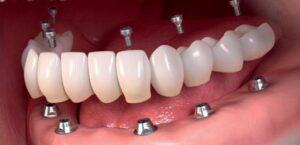Enquiry
Call Center:
+919355333956
Transform Your Smile Effortlessly: The Truth About Same Day Dental Implant Procedures
Need to replace missing teeth and on a tight schedule? Dental implant same day technology offers a fast track to restoring your smile—without the waiting period of traditional implants. In this article, we’ll explain the essentials: the same-day process, candidacy requirements, and aftercare, ensuring you’re well-informed to make the right decisions for your dental health.
Key Takeaways
- Same day dental implants offer immediate tooth replacement with a single surgery, skipping the lengthy osseointegration process of traditional implants, and involve advanced techniques like immediate loading and computer-guided placement.
- Patients must be assessed for eligibility to receive same day dental implants, considering factors like general health, bone density, and oral hygiene, and the procedure may not be advisable for those needing preliminary treatments or with certain health conditions.
- Post-operative care is essential for the success and longevity of same day implants, including following strict oral hygiene regimens, attending regular follow-ups, and avoiding behaviors that may jeopardize implant integration.

Why Immediate Dental Implants?
Generally, same-day dental implants provide patients with a temporary dental prosthesis immediately during the same visit after having the damaged tooth extracted and dental implant fixture (screw portion of the dental implant that is screwed into the jaw) placed.
The benefits of same-day dental implants over conventionally placed implants are very clear. You won’t have to wear a removable denture to hide missing teeth and the same-day dental implant process requires the least number of visits to the dentist.
This method of placing dental implants is generally only used on suitable patients who are time-sensitive to the entire treatment of conventionally placed dental implants.
Immediate dental implants are usually recommended for patients who:
- Have damaged or missing front teeth
- Are worried about missing teeth
- Are time & cost sensitive
- Don’t want to undergo multiple dental surgeries
- Are looking to get All-On-4 Implants
- Are already completely edentulous
However, same-day dental implants process is still not completely seamless. You’ll still need to come back for a follow-up visit at a later date to get your permanent prosthesis fitted in place and you’ll need to make sure to avoid chewing with the area where the dental implant was placed.
The same-day implant process:
It’s never literally just one single day. The term “immediate dental implants” or “same-day dental implant” generally only refers to the same-day placement procedure of the dental implant fixture + loading of a prosthesis (crown, bridge or denture) that you can walk out of the clinic with after the surgery.

Initial Dental Implant Consultation
It is important to note that the success of any same-day dental implant is highly dependant on the skills and expertise of the dental surgeon performing the procedure. This approach to placing dental implants is considered to be a highly technique sensitive requiring an expert dental implant team in order to be properly executed.
During your initial consultation, you’ll need to tell your dentist about your medical history and any existing health conditions or diseases that you may have, after which the dentist will thoroughly inspect your oral health through the use of dental x-rays and 3D imaging.
Through this in-depth analysis of your oral health, the dentist will determine if you are a suitable candidate for immediate dental implant surgery. Only certain patients and cases are suitable for same-day dental implant treatment as careful case selection, proper treatment planning and adherence of surgical and prosthetic protocols are key to the long-term success of immediate dental implants.
Once you’ve been deemed a suitable candidate for same-day dental implants, your dentist will then proceed to craft a customized treatment plan catered to meet your needs and requirements.
“Same-day dental implants” only means that the entire process for you will only take a single day. But for the dental team behind the scenes, it involves a detailed process of planning before the actual day of your surgery.
Once the treatment plan has been completed, you’ll be scheduled in for your actual surgery. Depending on the number of teeth that need to be replaced, you dentist will use one of three type of dental implant prosthesis.
Dental Implant Crown
Implant Supported Bridge
Implant Supported Denture

Extraction & Dental Implant Placement
In the case where a tooth extraction is required, then it’s either done weeks before your surgery or on the day of your implant surgery. This decision is generally based on the amount and condition of the bone you have in your jaw, this will be detailed in the treatment plan as well.
Extraction Process
The extraction process is typically done under local anaesthesia and is done carefully by gently manipulating the tooth until it becomes loose enough to remove. All infected tissue and bone is also usually removed during this process. The goal of any tooth extraction is to remove the tooth with as little disruption and damage to the extraction socket, surrounding gum tissue and adjacent teeth.
When done successfully, the tooth extraction process will allow for a smoother implant fixture ( titanium threaded screw shape post ) placement. This is especially important when the implant is going to be loaded immediately after surgery.
Dental Implant Surgery
The dental implant process can take a few hours if multiple implants are being placed. On the day of the surgery, you will be sedated using general anaesthesia or light local anaesthesia based on the number of implants that you’ll be getting that day.
However, this is mainly dependent on your pain tolerance and anxiety levels. Your dentist will recommend the best option based on your case.
Once you’ve been anaesthetized, the surgery can begin. Based on the complexity of your case, the surgical insertion of the dental implants will be done free-hand or with a fully customised digitally designed 3D printed surgical implant guide to help guide the dental implant in the correct position and angle during placement. The surgical guide are typically used for more complex cases as it enables the dentist to precisely place dental implants with a high margin of safety.
The dental implant site is then prepared and the dental implant is placed.
Prosthesis Placement
Once the dental implant has been placed, you’ll then be fitted with the dental prosthesis which will act as your replacement teeth (crown, bridge or denture). Depending on your case, the initial prosthesis fitted may only be temporary, while a permanent prosthesis will need to be fabricated. If this is the case, you’ll need to come back in a couple of weeks time to get the permanent prosthesis fitted.
The fitting of the prosthesis is an important part of the dental implant process as an ill-fitted dental prosthesis may potentially cause failure of the dental implants.

Healing and Checkups
Osseointegration and healing is a fundamental part of any dental implant treatment. This process allows the dental implants to permanently fuse to the jawbone, locking the dental implants in place. The osseointegration process will happen over the course of 4 – 6 month after your dental implant placement surgery. You will have to eat soft foods while this happens, especially during the first 8 weeks after you’ve gotten your immediate dental implants.
Moreover, you’ll still need to come back to the clinic in about a weeks time to get your final prosthesis and get your stitches removed.
After this, you will have another checkup so your dentist can make sure that your dental implants are secure and have properly osseointegrated with your jaw bone. Subsequently, your dentist will ask to see you once every 6 months, just to check and help maintain your dental implants.

Prosthesis Placement
Once the dental implant has been placed, you’ll then be fitted with the dental prosthesis which will act as your replacement teeth (crown, bridge or denture). Depending on your case, the initial prosthesis fitted may only be temporary, while a permanent prosthesis will need to be fabricated. If this is the case, you’ll need to come back in a couple of weeks time to get the permanent prosthesis fitted.
The fitting of the prosthesis is an important part of the dental implant process as an ill-fitted dental prosthesis may potentially cause failure of the dental implants.

Healing and Checkups
Osseointegration and healing is a fundamental part of any dental implant treatment. This process allows the dental implants to permanently fuse to the jawbone, locking the dental implants in place. The osseointegration process will happen over the course of 4 – 6 month after your dental implant placement surgery. You will have to eat soft foods while this happens, especially during the first 8 weeks after you’ve gotten your immediate dental implants.
Moreover, you’ll still need to come back to the clinic in about a weeks time to get your final prosthesis and get your stitches removed.
After this, you will have another checkup so your dentist can make sure that your dental implants are secure and have properly osseointegrated with your jaw bone. Subsequently, your dentist will ask to see you once every 6 months, just to check and help maintain your dental implants.
Risk of Same-Day Dental Implants
There are a number of risks involved when it comes to placing dental implants in general. However, these risks are generally increased when dental implants are placed and loaded immediately. There are some of the risks involved with same-day dental implants.
- Same Day Implant Treatment in Noida Sector 136
- Same Day Implant Treatment in Noida Sector 140A
- Same Day Implant Treatment in Noida Sector 93A
- Same Day Implant Treatment in Noida Sector 104
Tags : Same Day Implant Treatment in Noida Sector 150, Same Day Implant Treatment in Noida Sector 129, Same Day Implant Treatment in Noida Sector 93,
Same Day Implant Treatment in Noida Sector 168






 Call Or Whatsapp Now
Call Or Whatsapp Now